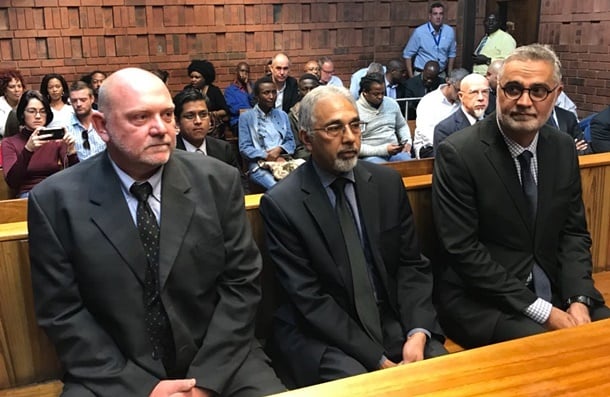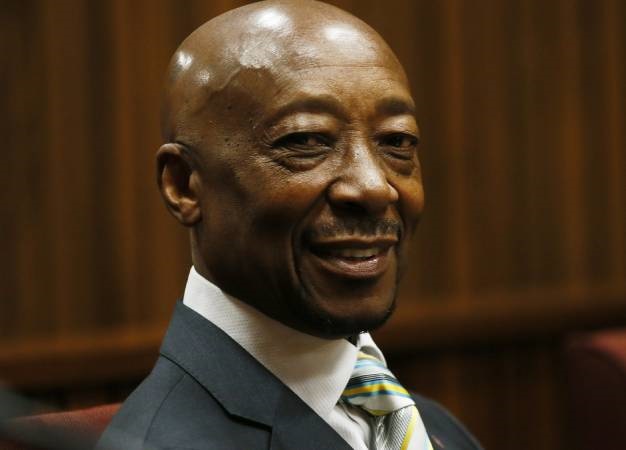- The report warns SARS it could be held civilly liable by affected employees who want to claim damages from the tax agency.
An internal report compiled by senior executives of the South African Revenue Service (SARS) and forwarded to tax boss Edward Kieswetter in March recommends that two key reports, which were used to drive the “rogue unit” narrative, be officially withdrawn, and affected employees offered an apology.
According to a copy of the 52-page report, which News24 has obtained, a committee tasked with investigating the need for reparations to SARS employees affected by allegations of illegal spying or their involvement in an alleged internal rogue unit, found that the contentious Sikhakhane and KPMG reports into SARS be withdrawn due to the “inaccurate or misleading information” it contained.
READ | ‘You’re free to go’ – Relief for ex-SARS officials as charges withdrawn in lengthy ‘rogue unit’ saga
Other employees, who were summarily pushed out of key positions into superfluous roles during a “restructuring” under axed SARS Commissioner Tom Moyane, were also interviewed by the committee.
The KPMG and Sikhakhane reports into events at the receiver were used by state capture elements to justify a purge of SARS leadership in 2014 and 2015, and provided support for those who drove the “rogue unit” narrative.
These reports SARS now say never gave affected employees a right of reply and must be scrapped.
Public Protector Busisiwe Mkhwebane also relied on these reports when she conducted an investigation that reiterated the old and disproven “rogue unit” narrative.
READ | Intelligence watchdog’s SARS ‘rogue unit’ report set aside, Van Loggerenberg calls on police, NPA to act
This report has been taken on review.
SARS says the report is a draft version, with the final report expected at the end of the month.
Sikhakhane told News24 on Wednesday that he had not been approached by SARS about the report. And KPMG say they know nothing about their report being “withdrawn”.
SARS should be careful not to ‘expose’ itself
The internal report also recommends that apologies be offered to 31 employees interviewed in January and February this year, but cautions that the apologies must be “crafted” in such a way “so that it does not further expose SARS to civil or employment litigation”.



Andries Janse van Rensburg, Ivan Pillay and Johan van Loggerenberg appear in the Pretoria Magistrate’s Court. (Alex Mitchley, News24)



Former South African Revenue Service commissioner Tom Moyane smiles inside the Gauteng High Court in Pretoria. (Phill Magakoe, Gallo Images, file)
But Kieswetter has not yet acted on the recommendations, even though the report was sent to him four months ago.
The report is unsigned and is seemingly unattended in SARS’ legal department.
Some of the 31 employees, who were interviewed as part of the process, have also indicated that they are anxious to receive feedback from SARS, with many still struggling with trauma, financial problems and workplace issues all directly related to the “rogue unit” drama during the state capture period.
One of the interviewed employees, who spoke on condition of anonymity, confirmed the contents of the report insofar as they relate to the concerns they raised before the committee.
They added they had recently started asking for feedback on the progress of the committee’s work, and were surprised to learn that a report had actually already been drafted.
But none of the key actors, who were central to the controversy at SARS in 2014 and 2015, were interviewed, with no mention of individuals like Ivan Pillay (former deputy commissioner), Johann van Loggerenberg (former head of the high-risk investigations unit) or Adrian Lackay (former spokesperson).
Some employees have bemoaned the fact that, although Kieswetter has been made aware of outstanding issues related to the state capture era, he is yet to respond to letters addressed to him.
The report also states that many interviewees believe that “they had seen no change” at SARS, notwithstanding the findings of the Nugent commission into SARS and Kieswetter’s appointment.
Reparations and an apology central to the matter
The internal report was compiled by a committee consisting of senior SARS executives, including former acting commissioner Mark Kingon, and completed with the assistance of external law firm Cliffe, Dekker, Hofmeyr (CDH).
The committee was led by William Mpye, the group executive for compliance risk and case selection, who was appointed by Kieswetter.
A SARS spokesperson confirmed a report was finalised in March, but Mpye is not in charge of the process anymore. He handed the draft version of the report to head of employment relations Sobantu Ndlangalavu in mid-June for completion.
“Commissioner Kieswetter, in ensuring further transparency, independence and technical integrity of the ongoing review process, has appointed legal advisors to advise on a number of people-related matters, including the matter under discussion.
“Moreover, he has appointed Mr Tshiqi, an independent specialist advisor on people-related matters in the Office of the Commissioner to, among others, finalise the internal review. Mr Tshiqi is urgently and confidentially engaging the parties concerned and will be making final recommendations to the Commissioner towards the end of July 2020,” the spokesperson said.
Although the committee was tasked to act on recommendations by the Nugent commission that reparations to affected employees be considered, the report seems to explore every possible avenue to prevent said reparations from being financial in nature and to protect SARS from further liability.
Interviewed employees detailed various instances of irregular and unfair suspensions and dismissals, victimisation, irregular disciplinary procedures, demotions, loss of income and other benefits and “interrogation” by certain state institutions. This was all related to the period of state capture under then-commissioner Moyane and an internal environment found by Nugent to be one of “fear and victimisation”.
The committee, however, regularly cites an October 2019 legal opinion, which states that aggrieved employees had legal recourse to the Centre for Conciliation, Mediation and Arbitration (CCMA) at the time and that “there is good reason not to pay reparation to this category of employees because they had a legal remedy. Reparations are not intended for persons with a legal remedy.”
One SARS insider described this as laughable, as during the Moyane era it was “impossible” for employees to speak out.
“For some of us, it was even more impossible to speak at all,” they told News24.
Employees had ‘little to no faith’ in the process
According to the addendums attached to the report, various employees offer detail of “vexatious” investigations and victimisation at the hands of SARS management and human resources department, false allegations made in the KPMG and Sikhakhane reports, emotional trauma suffered, demotions, loss of income and the incurring of expenses, like legal fees and private security.
Almost all the interviewed employees demand an apology from SARS, and many want financial reparations for damage and other losses.
The report makes it clear that, should SARS offer an apology, it will “further expose SARS to civil or employment litigation”.
“The identified employees stated that they were consulting with lawyers in relation to the harm they suffered during the review period. They were accordingly evaluating their options with regards to suing SARS and/or KPMG.
“Some identified employees could therefore try and use the information stated at the meeting to strengthen their case against SARS, i.e. they may say SARS admitted liability by apologising.
“SARS could say these discussions were ‘without prejudice’, i.e. in the pursuit of an amicable resolution or settlement. This is a risk that SARS will need to carefully manage,” the report states.
The committee did, however, offer an apology to every employee interviewed.
According to the report, during every interview “a member of the committee would extend an apology for the pain and suffering the identified employee and their family endured”.
One of the main recommendations to Kieswetter is that SARS “issues a formal apology to all the employees and their families negatively affected by the rogue unit narrative and the adverse actions which to in the review period”.
But, the committee warns, “the apology must be crafted in such a manner that it is not viewed as an admission of liability. The letter could be used by employees in any civil action which they may institute against SARS.”
The report states that some interviewees “had little or no faith” in the process and that they had, even under the new dispensation, been “repeatedly let down by SARS”.
Fears were also expressed that too many of the “Moyane cabal”, who assisted him “with the dismantling of SARS”, were still in the institution’s employ. A list of 17 names were published in the report.
Extracts from the interviews with the Mpye committee:
Yusuf Denath told the committee he felt “a deep sense of betrayal” by SARS.
Tony Apsey told the committee SARS needs to “look at the ‘red tape’ which is currently causing a lot of challenges for the organisation”. Apsey is quoted as saying the “red tape will kill us”.
Itumeleng Leeuw, a former member of the HRIU, told the committee that he wanted the impact of the “25 months [he] spent doing nothing” to be assessed and corrective measures taken. He and other members of the unit spent roughly two years in a boardroom at SARS with no work assigned to them.
Mohammed Latiff said a trust building exercise needed to be put in place to “help him trust the organisation and its systems again”.
Patricia Langa told the committee that the commissioner [Kieswetter] should be more responsive to correspondence as she “wrote to the then acting commissioner [Mark] Kingon and current commissioner and [received] no response”.
Background notes:
** Former SARS Commissioner Tom Moyane appointed KPMG in December 2014 to conduct an investigation into allegations of the existence of a covert unit at SARS, stemming from the Sikhakhane report.
** KPMG finalised this report in September 2015.
** The report recommended a raft of criminal investigations against numerous SARS officials associated with the HRIU. In September 2017, KPMG retracted the findings and recommendations of its report, and has since refunded to SARS the R23 million the audit firm was paid.
** Head of investigations and corporate forensics for KPMG in the UK, Roy Waligora, was asked in June 2018 why KPMG had not retracted the entire report. “We have withdrawn the conclusions and recommendations on the basis set out in the statements. The body of the document we have not withdrawn on the grounds that it is our work product….we acknowledge that it is not a perfect document… we think it is a reflection of the facts found in the investigations,” Waligora said.
** This is heavily disputed by former SARS officials, who have repeatedly called for the entire report to be withdrawn.
** Advocate Muzi Sikhakhane was appointed by SARS to look into allegations made against Van Loggerenberg by State Security Agency spy, Belinda Walter.
** This followed an initial probe by the Kanyane Panel, appointed by Pillay, which found that Walter’s allegations were not credible. Sikhakhane’s report, meanwhile, found that a covert unit did exist at SARS, and that it had been unlawfully established. This report was leaked to the Sunday Times to form part of a series of stories that Moyane used as the pretext to appoint KPMG.
** The Sunday Times later apologised and withdrew its reportage.
** Sikhakhane ultimately recommended a judicial commission of inquiry be established to ascertain the full facts – but Moyane never acted on this recommendation.

